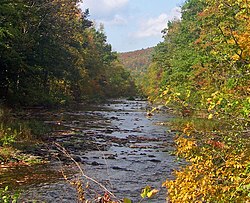| Rondout Creek | |
|---|---|
 | |
 Rondout/Wallkill watersheds | |
| Location | |
| Country | United States |
| State | New York |
| Region | Catskills |
| Counties | Ulster, Sullivan |
| Municipality | Towns of Olive, Denning, Neversink Wawarsing, Marbletown, Rochester, Rosendale, Esopus, Ulster |
| Physical characteristics | |
| Source | Rocky Mountain |
| • location | Olive |
| • coordinates | 41°58′17″N 74°21′56″W / 41.97139°N 74.36556°W |
| • elevation | 2,980 ft (910 m) |
| Mouth | Hudson River |
• location | Kingston |
• coordinates | 41°55′12″N 73°57′46″W / 41.92000°N 73.96278°W |
• elevation | 0 ft (0 m) |
| Basin size | 1,100 sq mi (2,800 km2)[1] |
| Discharge | |
| • average | 1,600 cu ft/s (45 m3/s) |
| • maximum | 35,000 cu ft/s (990 m3/s)[2] |
| Basin features | |
| Tributaries | |
| • left | Ver Nooy Kill, Rochester Creek |
| • right | Coxing Kill, Wallkill River |
Rondout Creek is a 63.3-mile-long (101.9 km)[3] tributary of the Hudson River in Ulster and Sullivan counties, New York, United States. It rises on Rocky Mountain in the eastern Catskills, flows south into Rondout Reservoir, part of New York City's water supply network, then into the valley between the Catskills and the Shawangunk Ridge, where it goes over High Falls and finally out to the Hudson at Kingston, receiving along the way the Wallkill River.
The name of Rondout Creek comes from the fort, or redoubt, that was erected near its mouth. The Dutch equivalent of the English word redoubt (meaning a fort or stronghold) is reduyt. In the Dutch records of Wildwyck, however, the spelling used to designate this same fort is invariably Ronduyt during the earliest period, with the present form rondout (often capitalized) appearing as early as November 22, 1666.[4]
The Rondout Creek became economically important in the 19th century when the Delaware and Hudson Canal followed closely alongside it from Napanoch to the village of Rondout, now part of Kingston, which grew rapidly as the canal's northern port. Today it is important not only for the reservoir, but for the fishing and other recreational opportunities it provides.
Due to the Wallkill, it drains a vast area stretching over 1,100 square miles (2,850 km2) all the way down to Sussex County, New Jersey. The high mountains around its upper course and the reservoir, which collects water from three others, also add to its flow.
- ^ COASTAL FISH & WILDLIFE HABITAT RATING FORM for Rondout Creek Archived 2009-03-27 at the Wayback Machine
- ^ "Peak Streamflow data for New York, Rondout Creek". Retrieved 2007-12-28.
- ^ U.S. Geological Survey. National Hydrography Dataset high-resolution flowline data. The National Map, accessed October 3, 2011
- ^ Hudson River Maritime Museum Archived 2008-05-12 at the Wayback Machine
